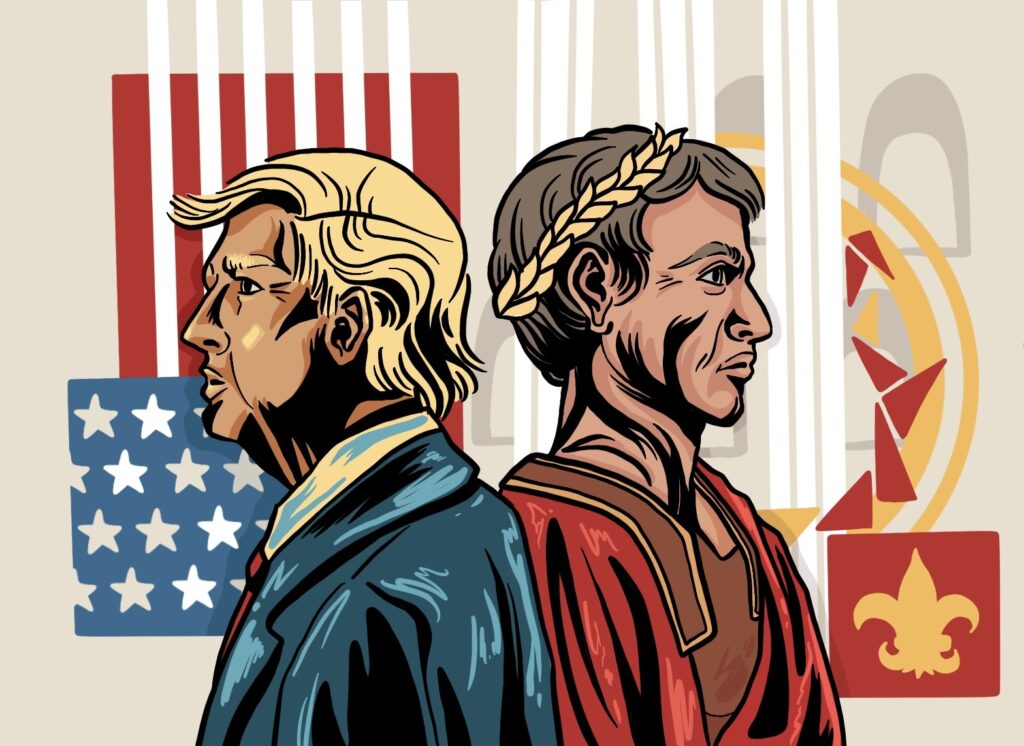
Ivana Chen/Staff Illustrator
Last year was fraught with a litany of social media trends. “Girl dinner” embraced low-effort meals and propelled charcuterie boards and incongruent snacks to the top of aesthetic Instagram accounts. “Quiet luxury” elevated understated wardrobe pieces and championed investment clothing over fast fashion. And, while food and style are frequently subject to cyclical trends, perhaps no one could have predicted that 2023 would also be the year the Roman Empire would reach its influential peak — despite falling over 1,000 years ago in 476 AD.
The meme first surfaced on TikTok in September 2023, drawing on a seemingly gender-specific obsession with ancient Rome. What started as women asking the men in their lives how often they think about the ancient civilization catalyzed a linguistic shift, evolving into a cheeky colloquialism. A “Roman Empire” can be anything that persistently captures someone’s attention, whether it be an ex-situationship, a particularly memorable meal at the dining hall or a night out gone awry. Although the Roman Empire has embedded itself into today’s mainstream culture as a catchy phrase, as the 2024 U.S. presidential election approaches, the actual history of the Roman Republic, and subsequent Roman Empire, serves as a powerful lesson of what should be on voters’ minds as they anticipate casting their ballots this fall.
During its peak, the Roman Empire exerted control from Roman Britain in the northwest to Egypt in the southeast. Today, the United States operates at a similar size and wields a parallel position on the global stage as a world superpower. Just as Rome’s military prowess enabled it to fight threats like the Germanic and Persian invasions, the U.S. military’s strength has allowed it to dominate defense strategy. Yet, it was the combination of persistent attacks and widening socioeconomic disparities that led to Rome’s eventual decline. This is reflected in the U.S. today with tax systems that exacerbate economic inequality and disproportionately affect the poor. It will take a sharp leader with a fresh proposal to reform these policies, and it is the responsibility of citizens to vote accordingly.
Former President Donald Trump — who is currently vying for another four years in The White House — is also fatefully commensurable to Rome’s most recognizable leader, Julius Caesar. Although the latter has been mythologized over time as one of history’s greatest military commanders, both men rose to power by embracing populism, appealing to the working class and evading traditional democratic norms. Trump’s disregard for the decorum of the highest office echoes Caesar’s defiance of sacred Roman traditions, creating an off-putting spectacle of demagoguery and masculine arrogance. Both leaders also maintained a tenacious grip on their political titles, with Caesar declaring himself dictator for life and Trump continually denying his defeat in the 2020 presidential race. Caesar’s rule ultimately left Rome divided, akin to the polarization that is rampant across America today in the wake of Trump’s presidency. Caesar’s story famously ended in assassination when he was stabbed to death by dozens of senators who opposed his authoritarian rule. While America has, fortunately, not endured a scene quite as dramatic, Trump has incited several instances of political violence in the past, including the Jan. 6 insurrection at the U.S. Capitol in 2021. This is a warning voters should heed as they consider their options for the presidency.
Ancient Rome was also characterized by deplorable hallmarks of American political life known all too well today, such as distraction, diversion and misinformation. Long before Trump ruled Twitter, Caesar had mastered the art of political propaganda, writing a book praising his own performance in the Gallic Wars.
Later in the Empire, Caesar’s adopted heir, Augustus, utilized a campaign of quippy slogans on coins to disparage General Mark Antony as a drunken womanizer. Sound similar to “Sleepy Joe?” Further, The Roman populace was continually pacified through the use of “bread and circuses,” a political strategy that strove to divert attention from government actions using marvels like free food and entertainment. The ancient phenomenon bears a striking similarity to the right’s recent obsession with conspiracy theories about everything from beloved pop stars to Pizzagate. Voters must not fall prey to these strategies; it is imperative to pay attention to the actions lawmakers are taking — not the deflections they tout.
The United States must not “cross the Rubicon,” a phrase that alludes to Caesar’s historic passage across the Rubicon River in 49 B.C. His journey ultimately began the civil war that shaped the end of the Republic, leading to the end of an era and a point of no return. Similarly, this moment represents an inflection point for democracy in America, and voters should heed the lessons of history’s past when making decisions about the country’s future. For a return to stability, it is evident that Trump cannot be reinstated as the next U.S. president. This is my “Roman Empire” for the beginning of 2024; consider it yours too.
Safa Wahidi (26C) is from Sugar Hill, Ga.
Safa Wahidi (she/her) (23Ox) is from Sugar Hill, GA, majoring in English and political science. She is an active member of the Emory Muslim Student Association and serves as Co-President of the Young Democrats of Oxford College. Outside of the Wheel, Wahidi enjoys writing fiction, watching rom-coms and anticipating the next Taylor Swift album. You can find her wandering around the nearest Barnes & Noble, tea and Jane Austen novel in hand.





